Benicio Del Toro Sicario: Day of the Soldado
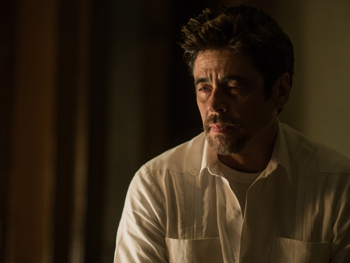
Back To Fight The Drug War
Cast: Benicio Del Toro, Josh Brolin, Isabela Moner, Catherine Keener, Matthew Modine, Manuel Garcia-Rulfo, Christopher Heyerdahl, Jeffrey Donovan
Director: Stefano Sollima
Genre: Action, Crime
Rated: MA
Running Time: 122 minutes
Synopsis: In Sicario: Day of the Soldado, the series begins a new chapter. In the drug war, there are no rules – and when the US government begins to suspect that cartels have started trafficking terrorists across the US border, federal agent Matt Graver (Josh Brolin) calls on the mysterious Alejandro (Benicio Del Toro), whose family was murdered by a cartel kingpin, to escalate the war in nefarious ways. Alejandro kidnaps the kingpin's daughter to inflame the conflict – but when the girl is seen as collateral damage, her fate will come between the two men as they question everything they are fighting for.
Sicario: Day of the Soldado
Release Date: June 28th, 2018
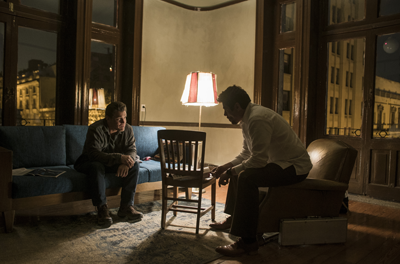 About The Production
About The Production
A New Chapter
Sicario: Day of the Soldado is an intense and relevant action-thriller propelled by two antihero protagonists who venture deep into the merciless border world of drug dealing and American foreign policy.
The film reteams Academy Award® winner Benicio Del Toro, as the mysterious attorney-turned-assassin Alejandro, with CIA operative Matt Graver, portrayed once again by Josh Brolin, to fight the cartels. Alejandro is tasked with kidnapping a drug kingpin's daughter to exacerbate an already volatile situation, a mission which ends up having very personal stakes for him.
"Alejandro's able to relive in some ways what happened to his own daughter," says Del Toro, "so that starts to change something in him."
The fate of the young girl, Isabela, hangs in the balance, forcing Alejandro and Matt to go toe-to-toe, each facing a moral dilemma in the middle of the drug war they are escalating. Ultimately, they must choose between her life or winning the war.
"They stage this war, underestimating the possible consequences," says director Stefano Sollima. Born and raised in Italy, Stefano Sollima has built his body of film and television work around often fine line that exists between cops and criminals with such projects as popular television series "Gomorrah" and "Romanzo Criminale (Crime Novel)", as well as award-winning features A.C.A.B.: All Cops Are Bastards and Suburra.
"Alejandro makes a decision based on conscience and ends up disobeying his orders and, in a way, he declares war with his partner," says Benicio Del Toro. "By doing this, Alejandro and Isabela are on their own."
At the start of the film, Matt Graver has returned from working in the Middle East and is given a new assignment from his CIA bosses, drawing him back into the border world. "In short, he needs to create chaos in order to ultimately have justice. And control," Josh Brolin says.
"Matt Graver is a believer that the end justifies the means, and morality is only relevant as it relates to your side, and it's a zero-sum game for him," says screenwriter Taylor Sheridan.
To get the job done, Matt Graver connects with Alejandro, the only man he knows who can help him get the job done right.
"They face a series of consequences that lead them to question their own integrity and where they fit into the larger political agenda," says Josh Brolin.
"I think one of the largest themes in the movie is humanity. Alejandro, who was sort of devoid of humanity in the first one, rediscovers his humanity, in a way. And Matt Graver, in a similar situation, discovers his humanity in a set of very unusual circumstances," says producer Edward L. McDonnell.
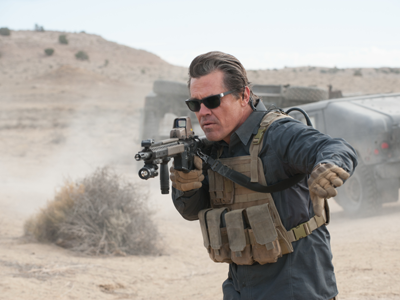 The script was once again written by Academy Award® nominee, Taylor Sheridan. The producers were thrilled to have Sheridan on board to craft another engaging Sicario story.
The script was once again written by Academy Award® nominee, Taylor Sheridan. The producers were thrilled to have Sheridan on board to craft another engaging Sicario story.
Says producer Molly Smith, "These were such iconic characters, and Taylor Sheridan had a great idea to take them on the next chapter of their journey."
"Taylor Sheridan 's got the modern western voice that people are craving," says producer Trent Luckinbill of Black Label Media. "We asked, 'What would you like to see these guys do and what story would you like to tell?'"
Taylor Sheridan explains how this idea reflects our current world and the volatile nature of the drug trade. "There's a changing landscape in America as far as the legalization of certain drugs, and an infusion of prescription drugs becoming recreational drugs of choice, that has left the cartels looking for a new product to sell," Taylor Sheridan says. "And I look at what that product is."
That product, now, is human lives: the trafficking of people across the border. "This is where the war on drugs has gone, and it's dark and heartbreaking, but powerful," says producer Molly Smith. "It's very real."
The Director
The topic of human trafficking resonated with director Stefano Sollima beyond just the US/Mexico border. "I think this is a topic that's actually real all over the world. Not just here in the US. It's the same in Europe. It's how people are trying to escape from really poor places, and the dream to be in another place where they hope to have a better life. Yet unfortunately, this is rarely the case," he says.
After the critical acclaim he received for his Italian TV series "Gomorrah," about the internal power struggles in a crime syndicate, and for the Italian crime thriller Suburra, which connected Italian politics and organized crime, Stefano Sollima was eager for his American feature debut. "I tend to gravitate towards the concept of the anti-hero, and how the motivation behind a character doing something seemingly bad is never simple," says Stefano Sollima. "There is often a very fine line between criminality and law enforcement.
This is a theme I've explored a lot in my past work with projects like 'Gomorrah' and 'Suburra.' I thought Taylor Sheridan and Denis Villeneuve created such a fascinating example of this in the first film, and I was very excited by the opportunity to revisit those themes here in a deeper way. Taylor Sheridan's strong characters gave me an opportunity to create a piece of entertainment that also deals with my fascination with the grey areas of law and order in a really intelligent way,"
Says producer Edward L. McDonnell, "Stefano was incredibly respectful of the first film and wanted to keep that dynamic going, with the ability to put his own stamp on the movie. He's definitely his own director; he's not copying anybody else. He came to the room and he understood who Matt and Alejandro were right away, and what the dynamics were between them."
Screenwriter Taylor Sheridan was likewise impressed. "It's very realistic and it's very unsentimental," he says. "We don't want to glorify the violence and we don't want to trivialize what people are going through. And so you need a filmmaker who's unflinching, who's not afraid to show some of these shocking things that take place, and yet is not going to enhance them for the sake of the story."
 Stylistically, Stefano Sollima assessed the style of the Sicario saga as being quite close to his own filmmaking style: "This project gave me a chance to use action and, in particular, physical effects, rather than visual effects, to put the actors in the moment and help dramatize the tough issues in the story. It's one of my favorite ways to work."
Stylistically, Stefano Sollima assessed the style of the Sicario saga as being quite close to his own filmmaking style: "This project gave me a chance to use action and, in particular, physical effects, rather than visual effects, to put the actors in the moment and help dramatize the tough issues in the story. It's one of my favorite ways to work."
World-class DP Dariusz Wolski, known for his work on the Pirates of the Caribbean movies and The Martian, was chosen to bring Stefano Sollima's vision and the world of Sicario to life.
"We're doing wide shots, close-ups. We definitely are trying to show a scale. Stefano Sollima is very much about scale. We're putting the characters into big conflicts in the environment, in the desert, in the border crossings," says Dariusz Wolski.
The way Stefano Sollima planned it, he would shoot "long, long takes, and stay with our characters, so we are not going to lose the characters even in the super massive moments of the movie," says the director.
The Characters
The tense, sometimes fraught relationship between Alejandro and Matt is at the heart of the Sicario saga. "You love the honesty and realism and how these characters are portrayed," says Stefano Sollima. "You can love them, but they are not always heroic. They kill people. They are brutal, they are tough. They are human. So by showing their humanity and their souls, it makes them sympathetic characters."
Josh Brolin adds, "We have two masculine protagonists that are sort of antagonists, but they're not. So that to me is what's interesting about this film. You have these guys that are good guys, but they're not really good guys. And they're dealing with something really bad, but they're dealing with people who are in such poverty that you understand."
Benicio Del Toro reflects on Alejandro's arc in Sicario: Day of the Soldado: "Alejandro's new assignment is to start a war between drug cartels. This means he has to pretend he's part of a drug cartel, and by doing so, in a way he has to reenact what they did to his own child. Through this journey, we learn that Alejandro has a conscience and he becomes the protector of the innocent victim."
"There's an emotional roller coaster, not so much about political issues, but about the human spirit," says Benicio Del Toro. "It's more about the characters and more about their plan, than about the big issues."
"To watch Benicio Del Toro immerse himself in a character is an incredible experience," says Stefano Sollima. "It's like he enters so completely in the character that everything he does makes sense, not for himself, but for the character."
Says Taylor Sheridan, "It's as though the souls of every victim of drug violence came together and formed one man whose mission is to seek vengeance and justice for them. It was really the idea behind Alejandro that that much sadness and pain conformed into a palpable rage that's then turned outward."
"Benicio Del Toro elevates every movie he's in," says Luckinbill. "He is a weight and power in every scene he's in. He can say so much without saying anything. He can cut his eyes and carry a scene."
Benicio Del Toro studied the Day of the Soldado script carefully, and would continue to scrutinise it every night during filming. Says producer Basil Iwanyk, "He's thinking about this movie 24/7, and not just his character. He's thinking about the entire movie. He wants it to feel real. He wants it to feel emotional. He wants it to work. And he is just so all-in, which you have to love."
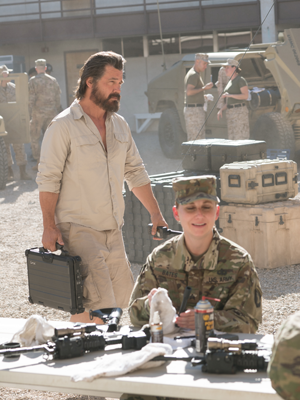 Executive producer Erica Lee says, "I think Alejandro will always be the soul to the Sicario movies. He is the heart that beats within them. He is our protagonist and antagonist, which is very nontraditional. Benicio Del Toro just brings so much weight to the movie. I think you're always going to want to watch him and follow him."
Executive producer Erica Lee says, "I think Alejandro will always be the soul to the Sicario movies. He is the heart that beats within them. He is our protagonist and antagonist, which is very nontraditional. Benicio Del Toro just brings so much weight to the movie. I think you're always going to want to watch him and follow him."
Josh Brolin says, "Sicario: Day of the Soldado takes very real scenarios and real possibilities, and even a real current event, and turning it into a condensed story that I think is beautiful, tragic, and has incredible scope. And it's respectful – respectful of the emotions that people go through."
On a personal level, "When you see Matt for the first time in this movie, something's shifted, something's changed, something's maybe a little more deepened, at least on a dirty scale. He's a little darker than he was before," describes Josh Brolin. "There's a lot of hubris and ego."
At the same time, he says, "There's a groundedness about him. He's very compassionate. Especially at the end of the movie. You get to see a part of him that you've never seen before. And I like being able to challenge myself in that. I love seeing a character with massive hubris who suddenly has to touch vulnerability, and you see that kind of fluctuation."
Matt Graver, brimming with witty cynicism yet ruthless when necessary, drives the storyline of Sicario: Day of the Soldado. Taylor Sheridan notes, "The fascinating thing about Josh Brolin as an actor is his range and ability to find ways to impart humor and yet real intensity in the same moment, and it seems to enhance the character's depth. He effortlessly gives a character three dimensions and real range."
As for Matt's relationship with Alejandro, "There's a lot more that's personally revealed in this film between the two of us. Which just makes it more intimate and more personal, and I think you care about these characters more because of it."
"Josh Brolin is an incredible human being, and as an actor he has a really important skill – he understands the entire scope of the movie. He knows perfectly where his character is in the moment, and also where all the other characters are. This gives him a sort of higher point of view that is pretty rare," says Stefano Sollima.
The role of the sheltered 12-year-old Isabela Reyes, daughter of a cartel kingpin, is played by Isabela Moner (Transformers: The Last Knight, 100 Things to Do Before High School). Comments Isabela Reyes, "Isabela and Alejandro's relationship is really interesting, because you basically watch it develop before your eyes. First, he has his doubts about her. He really couldn't care less about her. Isabela Reyes feels the same about him – she just wants to get home. And then, as the story progresses, you really start to see them connect."
It was a crucial role to cast. McDonnell says, "She is the innocent, but is surrounded by the corrupt. And so, it's a question of being able to bring that innocent to a place where she's safe. And both Matt and Alejandro, at the beginning of the movie, aren't so sure she is somebody that they can rescue."
As Isabela becomes a reminder to Alejandro of the daughter he lost, says Basil Iwanyk, "He extrapolates what it would have been like if she did survive."
Benicio Del Toro, who spends much of the film as her protector, was impressed with the Isabela Moner's talent. "She has that gift, the connection between intellect and emotions. She's like an old soul," he says.
Josh Brolin adds, "There is something about her – she's so good. Once in a while there are actors that come along and have immediate access, who can channel emotion in their performance with ease, and she has it."
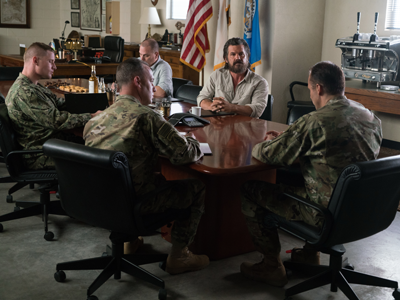 For Catherine Keener (Capote, Being John Malkovich), it was a meeting with director Stefano Sollima that convinced her to sign on to play CIA Deputy Director Cynthia Foard. She remembers, "He talked about her soul and that she wasn't necessarily an overtly empathetic person because she's the deputy director of the CIA and she has a job to do." At the same time, "She is a woman and is confident in her intellect. She doesn't have to compensate by behaving like a man."
For Catherine Keener (Capote, Being John Malkovich), it was a meeting with director Stefano Sollima that convinced her to sign on to play CIA Deputy Director Cynthia Foard. She remembers, "He talked about her soul and that she wasn't necessarily an overtly empathetic person because she's the deputy director of the CIA and she has a job to do." At the same time, "She is a woman and is confident in her intellect. She doesn't have to compensate by behaving like a man."
"Josh Brolin's character is a patriot. I believe Cynthia Foard is as well," Catherine Keener continues.
Basil Iwanyk says, "Catherine Kenner is tough, but there's also a slight softness to her, which is really interesting to see how she plays it, because she makes some very rough decisions in the movie and I don't think you're going to see that coming."
Returning as contractor Steve Forsing is Jeffrey Donovan (Sicario, "Burn Notice"). "When I met with Stefano Sollima, he discussed how the Steve Forsing character was a nice amount of levity in very dark scenes," notes Jeffrey Donovan. Which rang true to Jeffrey Donovan, too: "A lot of these guys that I've met, these real guys, the real Steve Forsings, were always joking during dangerous missions. And that's how they dealt with the difficulty of what they were experiencing. And during shooting especially with Black Label Media's Trent Luckinbill, he really encouraged me to do what I did in the first movie which was bring sarcasm and humor to the role."
Elijah Rodriguez (Book of Life) portrays 14-year-old Miguel Hernandez, who is led into the cartel life by his older cousin Hector (David Castaneda). The determined Miguel Hernandez lives in McAllen, Texas, which is where Elijah Rodriguez grew up as well. "Miguel Hernandez is ambitious. He cares about people but he also wants more. And he'll do anything to get there. He'll make the tough decisions that other people aren't willing to make. So I feel like he's really ambitious and strong-willed," reflects Elijah Rodriguez. "He sees his cousin Hector's life and he compares that to his dad's life, and he wants what Hector has. That adventure. Those trips. All of it."
Portraying the brutal cartel manager Gallo is Mexican actor Manuel Garcia-Rulfo (The Magnificent Seven), who grew up in Guadalajara. Manuel Garcia-Rulfo says, "From what I've learned all my life, growing up in Mexico, and people I know who are in that kind of business, I think Sicario was very real. It was very close to reality. And this script as well. From my point of view, there isn't a bad side or a good side, the US or Mexico. One consumes, one sells; one sells drugs, one sells guns. In both films in the Sicario series, they portray the reality very well."
Playing Hector, the good-time-guy with a touch of vanity who guides his younger cousin Miguel into the cartel world, is Mexican-American actor David Castañeda (End of Watch, "Jane the Virgin"). David Castañeda is in real life a dual citizen of Mexico and the US, as is his character. The actor spent his childhood in Sinaloa, Mexico. "Hector is cool, he's caring, and he loves Miguel. He wants to see him succeed," says David Castañeda. "He sees Miguel as himself, when he was younger. And Hector always wanted an older brother. He always wanted someone to look up to. He didn't have that. So he sees he can do right by kind of bringing Miguel along into this world, where he can actually succeed."
At the top of the Soldado power hierarchy is Secretary of Defense James Riley, the man with the plan and the clout to set that plan in motion, played by Matthew Modine (Full Metal Jacket, Birdy). "James Riley is a person who is in a position who has to make decisions. He answers to the President of the United States, and there's that chain of command," explains Modine. "I think that with these kind of characters, what's important is not exposing too much. It's like you're playing poker."
Start Of Production
Sicario: Day of the Soldado began production on a cold November morning in a ramshackle adobe house under the freeway near downtown Albuquerque, a locale which was doubling for the blue-collar neighborhood where Miguel lives in McAllen, Texas.
During the next three months, filming would take place in New Mexico's Albuquerque, To'hajiilee Reservation, Laguna Pueblo, Bernalillo, Santa Clara Pueblo, Belen, and Algodones. Most location were rural exteriors, with shooting taking place on many frigid nights. Whereas Sicario had been shot in summertime, Sicario: Day of the Soldado filmed in late 2016 as icy winter gripped the Southwest mountains and mesas. The filmmakers emphasized a sense of harsh realism as production roamed the barren Southwest landscape where the border stretches for hundreds of miles, with New Mexico often doubling for Texas.
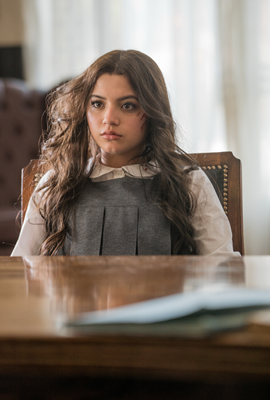 To shoot an early scene in the movie where the Department of Homeland Security monitors migrants who are escaping across the border at night, production utilised the FLIR thermal cameras that the government actually uses.
To shoot an early scene in the movie where the Department of Homeland Security monitors migrants who are escaping across the border at night, production utilised the FLIR thermal cameras that the government actually uses.
Military accoutrements abounded, including Blackhawk helicopters, Humvee military vehicles, machine guns, bullet-proof vests, surveillance cameras, and combat uniforms. The longest action sequence was the Humvee convoy ambush which occurs about halfway through the movie. It was filmed over the course of a week at To'hajiilee Indian Reservation. Long takes of elaborate action were choreographed, then shot using dolly track, with numerous characters, machine gun fire, and explosions all captured with raw realism. Says director Stefano Sollima, "The challenge there is even in a huge action sequence, to always be with your characters and have their point of view in the action."
In mid-January, cast and crew wrapped in New Mexico, the next day boarding a charter flight for Mexico City, where filming continued through late January 2017.
Vast Locations In New Mexico
Most of Sicario: Day of the Soldado was filmed on location in rural areas surrounding Albuquerque, New Mexico, with 90% of the movie shot outside.
Production roamed north to an Indian Pueblo along the Rio Grande River for two nights of river-crossing scenes in inky darkness, west to sparsely populated Indian reservations covered with tumbleweeds, south to sandy arroyos, and east to a big-box store doubling for a big-box store in Kansas.
The most-utilized location was To'hajiilee Indian Reservation in west central New Mexico, home to the Cañoncito Band of Navajo and settled during the "Long Walk," when Navajo tribal people were forced to relocate. Today, this reservation sprawls over 122,000 square miles and contains only 1,600 residents. The terrain contains sagebrush, cactus, rocky dirt roads, desert mesas, and red buttes, a landscape so remote that bands of cattle and wild horses freely wander across roads. Here, production filmed the migrants fleeing for cover as helicopter beams catch them crossing the border at night, the extended action sequence of the Humvee border ambush, and the scenes at Angel's farm. The rural isolation epitomized the look of the film.
Says Orona, "Whether it was a road, an arroyo, a house, there was always a focus on desolation and isolation in this movie. It was about finding places that were gritty and impoverished or forgotten."
Modest areas of Albuquerque doubled for the dusty environs of McAllen, Texas, including Miguel's small home, his worn-out public school, and the food court at the mall. Orona says, "The Texas section has to allude to physical and monetary disadvantages and desolation that build for Miguel: 'I come from nothing and I want the grander things that these cartel guys have.'"
For the scenes crossing the Rio Grande River and along its riverbanks, production filmed at Santa Clara Pueblo near Los Alamos and on a ranch in Algodones. Scenes set in the Mexico border town of Reynosa were mostly filmed at Albuquerque's seamy Railyard and on Laguna Pueblo, which occupies 500,000 acres of desert wilderness.
Many of the arroyo scenes were filmed in sandy arroyos south of Albuquerque. The airport scenes were filmed at two private airports in the Albuquerque area: Atlantic Aviation and Double Eagle II Airport. The Texas safe house was situated in the town of Belen.
For its final day in New Mexico, Sicario: Day of the Soldado filmed at a border crossing set built by production, containing car lanes and toll booths and "Welcome to Mexico" signs, with vendors selling street food. Here, the Humvee convoy sped through the toll booths at 40 miles an hour, spraying dust and gravel in its wake.
The next day, cast and crew boarded a charter flight headed south into Mexico.
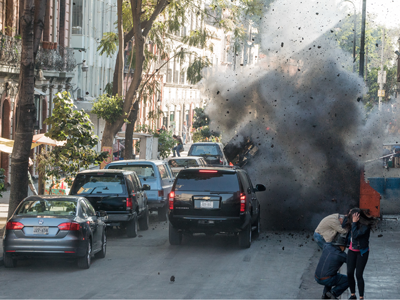 Urban Locations In Mexico
Urban Locations In Mexico
Sicario: Day of the Soldado spent its final two weeks in Mexico City, providing authenticity and a sense of the exotic that adds to the magnitude of Matt and Alejandro's mission. These metropolitan locales infuse the film with commercial activity, color, and more substantial architecture alluding to the power and money its most successful cartel kingpins possess.
The most extensive scene filmed in Mexico City was the extended action sequence depicting Isabela's extraction, which was filmed during two days on the República de Perú in downtown Mexico City's historic district. Production shut down the street, filling the scene with Mexican background players including pedestrians, drivers, police, police investigators, and EMTs. The architecture, with stucco-clad Spanish Colonial buildings next to ornate Baroque, Neoclassical, Italianate, Art Nouveau, Beaux-Arts, and Art Deco structures dating back to the 1600s, emphasized the risks involved in the kidnapping.
Alejandro's apartment was also filmed in downtown Mexico City's historic district. "It's in a very Colonial building, a five-story building, and we're using one of the top floors that overlooks the city," describes production designer Kevin Kavanaugh. "The exterior is around the corner in an alley way."
The exterior of the lawyer's office was filmed in the shiny Santa Fe District, Mexico City's ultramodern business quarter located on its west side. This wealthy area developed during the last 20 years is filled with hard-edged, geometric high-rises, the glass and steel structures soaring over cement streets, with many million-dollar multinational and Mexican conglomerates headquartered in this area. Numerous Mexican background and supporting players appear here, including news reporters, state police, Federales, EMTs, drivers, plainclothes investigators, Mexican army, and business executives.
The scenes at Isabela's opulent school were shot at a private girls' school in Mexico City boasting an elite campus constructed in a fortress-style oval, with manicured green lawns, decorative columns, and tiled stairs. The interior of the school was chosen for its 1940s Art Deco design and extravagant stained-glass windows. The exterior of the school was filmed on handsome Mesones Street, said to be the most tree-lined street in all of downtown Mexico City.
Isabela's mansion is inside a walled compound in the village of Coyoacán, a bohemian area with its famed fountain, narrow cobblestone streets, cobalt-blue walls, and many intimate plazas. Nicknamed the "Barrio Mágico," the neighborhood is home to the Frida Kahlo Museum.
The penthouse of the hotel from which Matt's team observes Isabela's departure from her school, was filmed at the lavish Marquis Reforma Hotel & Spa, a five-star hotel with Art Deco influences on the busy Paseo de la Reforma.
Various driving scenes were also shot in Mexico.
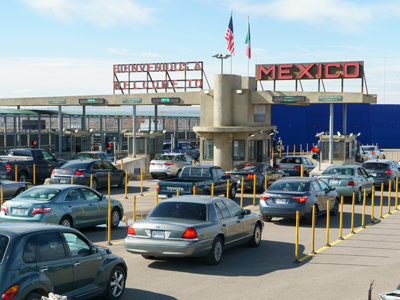 Production Design And Costume Design
Production Design And Costume Design
The look of Sicario: Day of the Soldado emphasizes a neutral palette of grays and browns, and is established with an array of sets.
Production Designer Kevin Kavanaugh says, "I painted all the Humvees and trucks in dark grays and blacks, to give a contrast to New Mexico's browns, to pop out, as opposed to going with the traditional tan Humvees. When we get to Mexico, there are pops of color, walls painted blue. A little bit of color in a contrast-y sort of way. I did research into border towns, and scouted in Mexico. It's realistic but at the same time cinematic. We're not making a documentary here. We picked the right angles, focused on what looked good."
For the scenes in McAllen, "It's a realistic look of what it's like to live in a small Texas town. It's got a little grit to it, a little bit of age on it, and a little bit of a South Texas vibe to it."
Across the border in run-down Reynosa, "There's more age, more dirt, more graffiti. I'm trying to exaggerate a border town in the US, for a border town in Mexico. I'm trying to show the contrast between the two worlds that Miguel has to navigate through," explains Kevin Kavanaugh.
When filming in Laguna Pueblo which doubled for Reynosa, "There's a great bowl of buildings and structures that resemble what we scouted in Mexico. They're run-down adobe. We brought some color in. We painted the walls and aged them down."
In the Reynosa warehouse, Kevin Kavanaugh mixed fluorescent lights with the headlights of vehicles for an edgy, unsafe feeling. Inside the warehouse, everything was painted dark orange, black, and blue, then the headlights penetrated the darkened interiors.
In Mexico City, "The streets are much more congested. Colonial architecture mixed with Art Deco and all that architecture in Mexico City," describes Kevin Kavanaugh. "More color, more ornate architecture, more details, street vendors, shops. The way the buildings are painted, the signage, even what the people wear"more color. And I really wanted to show the grandness and the historical value of the metropolis of Mexico City, compared to the Texas look, which is very small-town."
Vehicles proliferate in Sicario: Day of the Soldado, particularly the convoy of dark-gray, slant-back Humvees, as well as Hector's 1978 silver Camaro coupe. The two Blackhawk choppers in which Matt often travels were obtained from Washington State, and trucked in on trailers. Kevin Kavanaugh's art department painted them gray and applied decals related to the movie's narrative. "The idea behind those is that they're bought by subcontractors and leased to Josh Brolin's character," identifies Kevin Kavanaugh.
Costume designer Deborah L. Scott likewise accentuated an overall subdued palette for the movie, largely relying on blacks, grays, browns, neutrals, greens, and earth tones for most of the costumes.
She collaborated with Benicio Del Toro on the concept that the enigmatic Alejandro attires himself differently to fit into different environments unnoticed. "He kind of takes on different costumes that are basically a camouflage," describes Deborah L. Scott. Benicio Del Toro wears Wrangler pants and a knit tie in one scene; black combat gear in another. For much of the latter part of the movie, he goes underground in jeans, an aged red plaid shirt, blanket shawl, and aged cowboy hat.
Matt Graver's trademark flip-flops are gone in Day of the Soldado, replaced by an equally irrepressible form of footwear: Crocs. "The Crocs were a join operation between Stefano and Josh Brolin," says Deborah L. Scott. "Josh Brolin didn't want to repeat the flip-flops."
 About The Music
About The Music
The musical score for Sicario: Day of the Soldado is by Hildur Gu─nadóttir. For many years, Gu─nadóttir was a protégé and collaborative partner with composer Jóhann Johannsson, who composed the score for Sicario before his untimely passing earlier this year.
For Stefano Sollima, there was no better choice to continue the work than Gu─nadóttir. "Hildur is uniquely able to create an electronic sound from a classic instrument like the Violoncello, and has the skill to elaborate the sound in such a deep way that it finally differs from the actual instrument," says Stefano Sollima. "Aside from the fact that she already collaborated with Jóhann Johannsson and was part of the same movement, her organic manipulation of sound was the main reason why I thought she could compose the perfect score for this film. She captured the specific emotional stakes for the characters in her own personal way."
"We worked together very closely on almost every single project we both did for about 15 years," Gu─nadóttir explains. "He passed away so recently, so I have not really digested that he is no longer here. But I don´t feel like I have picked up a baton, I am simply carrying on with the work that we were already doing. That feels both natural and very surreal, for lack of better words or digestion."
Continuing that work meant approaching the score in a way that would incorporate some familiar elements without being repetitive. "The most identical theme of Sicario is 'The Beast' – with downward bass glissandos and distorted drums. Although we didn´t want to do a remake of that track, there are some references to that sound world and tonality," Gu─nadóttir says.
"Jóhann Johannsson recommended Hildur," notes producer Molly Smith. "She created an amazing original score, one that is in some ways reminiscent of course of Sicario's brilliant score by Jóhann Johannsson, but it is also fresh and new as well, it's also fresh and new as well, and just an incredibly powerful score."
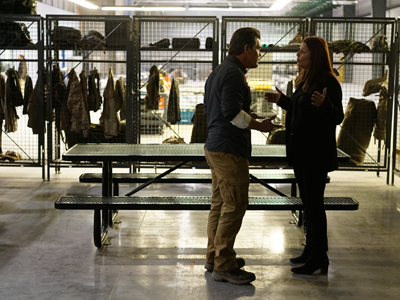 "It felt important to have some connection to the previous tonality to stay in the same world, but at the same time allow space for creating something completely different. There are quite a few tracks that go in a very different direction from the previous soundtrack.
"It felt important to have some connection to the previous tonality to stay in the same world, but at the same time allow space for creating something completely different. There are quite a few tracks that go in a very different direction from the previous soundtrack.
Gu─nadóttir says that if the Sicario: Day of the Soldado score is more emotional, it is a reflection the film's emotional core. "This one is a bit more of a 'classical' score, with musical themes that follow certain emotional landscapes. That is something that was important to Stefano," she says. "There is also a lot more music in Sicario: Day of the Soldado; I think it´s twice the length of the previous score. That gives it a bit of a different feel as a score, because the function of it is different. That is also a direction that was important to Stefano. He was also very vocal about the fact that he did not want to recreate the Sicario soundtrack, so he often wanted to go in very different directions from Sicario."
Still, there are similarities. "The similarities are probably most obvious in the soundworld itself; since I was quite a bit part of the first score, there will naturally be similarities in what I create for the sequel. Having worked hand in hand with Jóhann Johannsson for half my life, the way we thought about and created music was very intertwined and we had a very big influence on each other, so I guess the thought process for both scores are quite similar."
Sicario: Day of the Soldado
Release Date: June 28th, 2018
MORE
- Emma Stone Magic in the Moonlight
- Jessica De Gouw Cut Snake
- Maxine Peake Funny Cow
- Denzel The Equalizer 2
- Johnny Flynn Beast
- Logan Marshall Green Upgrade
- Shailene Woodley Adrift
- Eric Toledano and Olivier Nakache C'est La Vie...
- Andr├ę Leon Talley The Gospel According To Andr├ę...
- Shakespeare In Tokyo
- Mission: Impossible Fallout
- Glenn Close The Wife
- Allison Chhorn Stanley's Mouth Interview
- Benicio Del Toro Sicario: Day of the Soldado
- Dame Judi Dench Tea With The Dames
- Sandra Bullock Ocean's 8
- Chris Pratt Jurassic World: Fallen Kingdom
- Claudia Sangiorgi Dalimore and Michelle Grace...
- Rachel McAdams Disobedience Interview
- Sebastián Lelio and Alessandro Nivola...
- Perri Cummings Trench Interview



